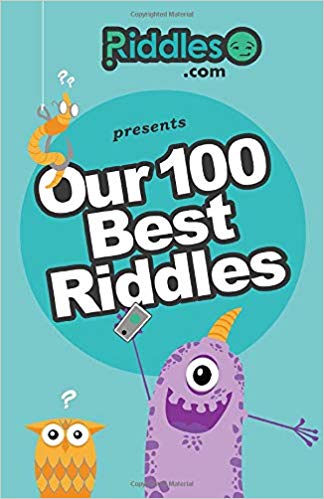Enter a keyword into the search box. The riddle search will check to see if the word is in the Title, Riddle, or Answer and return results if they exist.
"Hat" Riddles - Next 10 of 3446.
Riddle:
I am something you throw away my outside eat my inside and throw away my inside. What am I?
Answer: MANGO/POPSICLE
Riddle:
What do you call a priest riding a cycle?
Answer: A cyclist.
Riddle:
There was an intelligent eagle that didn't know to how read words. Once he went to complain about a thief and while coming home, he saw a dead bird but didn't use his flesh to eat. Why?
Answer: Because he saw the police station and it is ill-eagle.
Riddle:
A nurse was speaking with a young doctor just prior to their entering the room where the surgery was to take place. "You know," said the nurse, "I am surprised you are going to attempt surgery on this patient again, since you have failed in all of your previous attempts. You are lucky this patient is unable to make any complaints concerning your failed surgical attempts, and sue you for malpractice! So far, you have botched his knee, ankle, heart, and rib surgeries, and now you are going to try to remove insects from this man's stomach. What's next, brain surgery?" "After today's operation, I believe I will do just that!," replied the doctor in a defiant tone, "and this time there will be no nose bleed, or a red nose of any kind during the surgery." "That'll be the day," replied the nurse. "I will be right next to you during the operation, so when you mess up, I'll have a good laugh!" What kind of twisted, warped, medical professionals are these two? Why haven't both of them been permanently banned from practicing medicine? Just what exactly is going on here?
Answer: While on break, several of the doctors and nurses at a hospital have been competing against one another in the classic game of Operation. This doctor, although he failed at removing the patient’s water on the knee, wrenched ankle, broken heart, and spare ribs, felt confident he could remove the butterflies from the patient’s stomach without causing the patient’s nose to light up red and trigger a buzzer sound signifying failure.
Riddle:
My family is known to be crazy;
I'm good when I'm alone and when spread I am amazing;
It's a matter of taste;
I'm good for your health, bad for your waist.
What am I?
Answer: Peanut
Riddle:
A camel travels a certain distance each day. Strangely enough, two of its legs travel 30 miles each day and the other two legs travel nearly 31 miles. It would seem that two of the camel's legs must be one mile ahead of the other two legs, but of course this can't be true. Since the camel is normal, how is this situation possible?
Answer: The camel operates a mill and travels in a circular clockwise direction. The two outside legs will travel a greater distance than the two inside legs.
Riddle:
I am an object, I takes pill at first, keeps your head safe, and becomes low at last. What am I?
Answer: A pillow.
Riddle:
A famous magician and his assistant are standing in the middle of a large, empty field. There are no trees or buildings to be seen, and there are no ropes or hidden wires attached to the two performer's bodies. A large group of curious onlookers and their families are present to see the magician's farewell performance, as advertised in the local newspapers. The magician suddenly raises both hands and dramatically shouts to the audience, "My assistant and I will now rise from this very ground and disappear from your sight, but in three hours we will reappear in a town ten miles from here!" And with those final words, the magician and his assistant slowly lifted from the ground, continuing to rise majestically, until they were out of sight! True to his word, he and his assistant did reappear in another town ten miles from the place where they had first disappeared --- in the predicted three hours' time! What a fantastic trick!! How do you think they accomplished such an amazing feat?
Answer: The magician and his assistant used a hot-air balloon to rise up and disappear from the field. They were able to navigate and land it in a similar field in a town ten miles away.
Riddle:
Ten men, five women, and 15 three-year-olds are being watched by thousands of cheering people. The men and the women and the three-year-olds are observed slowly entering 15 box-like structures, each having iron bars in the front. The men and women are not related to the three-year-olds, but at times witnesses have reported seeing these adults whip these three-year-olds to force them to obey their commands. Fortunately, the barred doors suddenly spring open and the men, women, and three-year-olds make their escape; however, they are easily tracked, as they always feel compelled to travel to the left, and never to the right. The thousands of people watching these proceedings are all waiting to see who will be the first to meet their end. These circumstances are inexcusable in a civilized society! How can thousands of people just idly sit by and cheer while a group of men and women whip a bunch of three-year-olds before their very eyes? What is wrong with society? Or, is there a simple explanation for these bizarre-sounding events? Just what exactly is going on here?
Answer: With a maximum of 20 entrants in each race, the Kentucky Derby, the Preakness, and the Belmont Stakes feature only three-year-old thoroughbreds racing from their starting gates to their end at the finish line. Not all of the jockeys use whips on their horses, but many still do. By the way, to answer the title question: at the start of every race, they are not on —— They’re off!!!
Riddle:
What do you call a tick that loves math?
Answer: An Arithme-tic.

